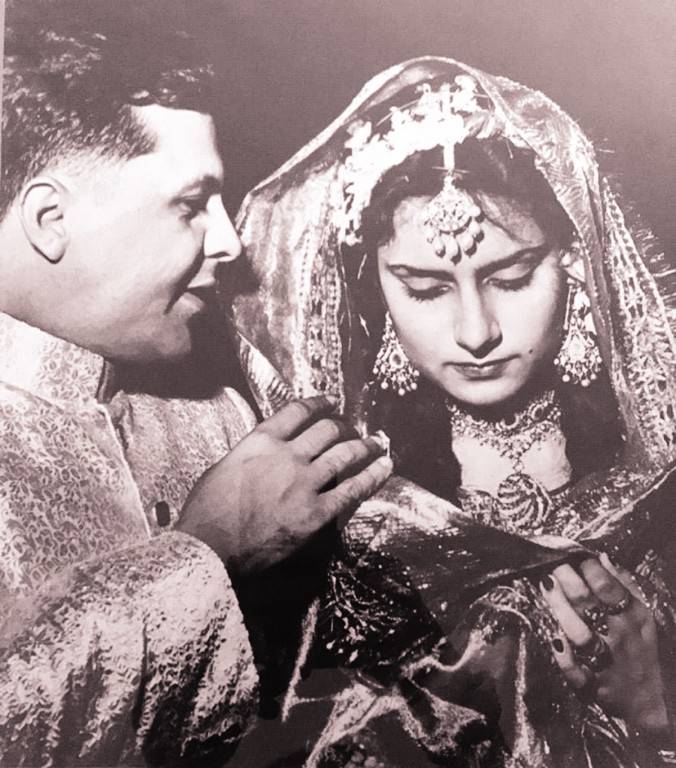
He was a quiet man who preferred to be alone than in crowds; who towards the end of his years gave up the worldly life, became an ascetic and totally devoted his time to the worship of Allah; who would keep awake all night reciting the Holy Quran, some say in conversation with other beings; whose spirituality sprang from the Chishtia order of Baba Farid Ganj Shakar that he was a disciple of; whose attire was a dhoti (loin cloth), a bandi (waistcoat) and kharanv (wood sandals); whose food was plain roti and paani (water); who fasted almost all year long; who passed away in that state of fasting in his sleep – that is how, as a child, I saw the last years of my paternal grandfather Sahabzada Khan Bahadur Mushtaq Ahmad Khan.
This once tall, lean, handsome Pathan, born in 1889 in Moradabad, India, was the son of Nawab Sajjad Ahmad Khan ‘Raees-e-Azam Moradabad’ and Malika Ferozi Begum. Ferozi Begum’s family was from Malakand and bore the title of ‘Sahabzadgaan of Malakand.’ As the story goes, her parents had moved with their family to Moradabad after the 1897 Siege of Malakand by the British.
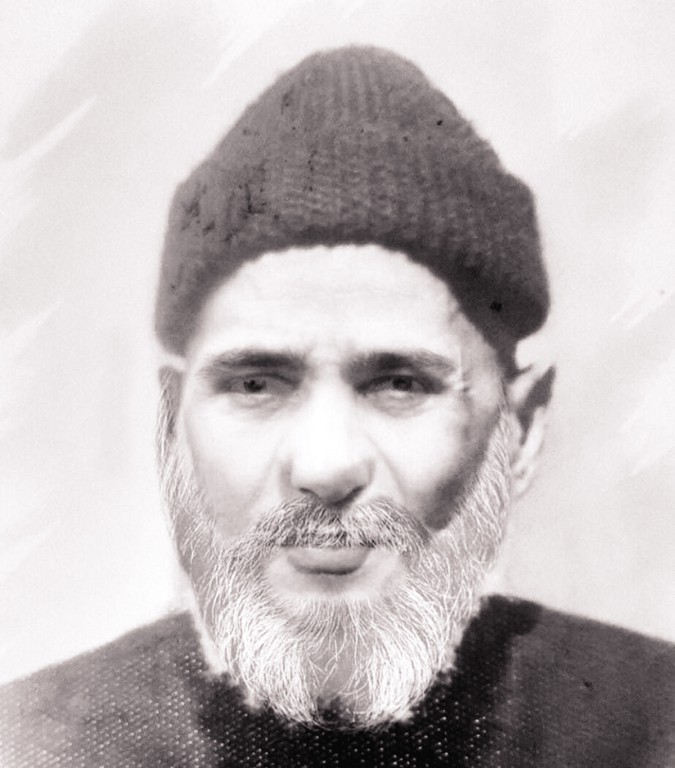
Sahabzada Mushtaq Ahmed Khan grew up with his other two younger siblings Sahabzada Shafaat Ahmad Khan and Sahabzadi Kishwar Zamani Begum in the family’s palatial haveli in Moradabad. He was his mother’s ‘Chanda’ and her clinging love demanded more time and attention from him than from the other children. Mushtaq had to forsake going abroad for higher studies because of his mother’s emotional dependence on him; indeed her love for him was such that on her deathbed her last cry was ‘Chanda!’
Mushtaq thus missed out on a possible sparkling career and the popularity that his younger brother Shafaat enjoyed. Sir Shafaat went on to get his Doctorate degree in History from Dublin, Ireland, becoming a Professor of History and Chair of the Modern Indian History Department at the University of Allahabad. His marriage, arranged by Sir Syed Ahmed Khan to Begum Fehmida Khanum, daughter of Justice Shahdin, was a union of two politically influential families. Mushtaq’s sister Kishwer Zamani Begum, too, was an institution in herself. A truly emancipated woman far ahead of her times, she had shed her burqa, smoked publicly and had joined politics. She chose to marry Dr. Col. M.A.Rahman, a surgeon in the prestigious Royal Army Medical Corps(RAMC).
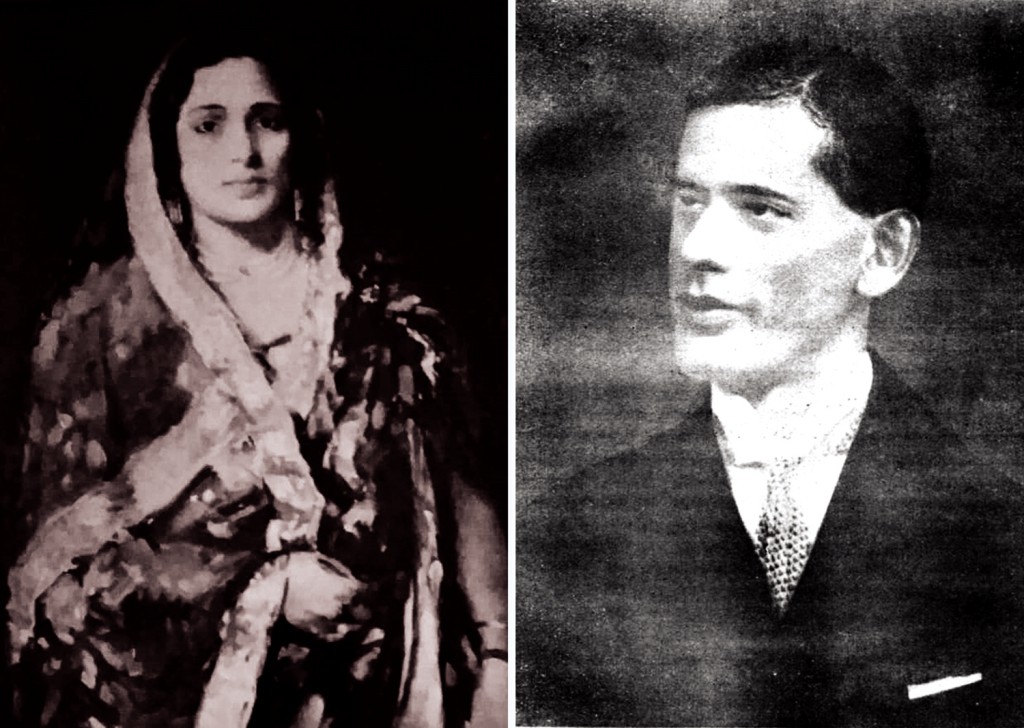
It is no wonder that Mushtaq felt a bit disadvantaged compared to his larger-than-life siblings. Getting married to the autocratic Malika Husn Ara Begum (Dillan) daughter of the Nawab Sikander Begum, princess of Rampur, did not make life easier. But while she scoffed and belittled him now and then, she made him the richest of them all. Her dowry inundated Mushtaq’s coffers. They built in village Mankula, Moradabad, a splendid haveli on 10 acres of wooded land. Mushtaq with his deep aesthetic sense and creative ability knew what his dream house would be like. Rolling gardens where his children and grandchildren would romp, mango and peepal and neem trees that they would swing from, atop an old wooden swing right above that lawn thatch that would cushion their fall, bushy tangled thickets where they would hide; a huge, open-to-the-sky tile-mosaic inner courtyard where wedding festivities would be conducted; outer courtyards with charming arbours, completely screened against mosquitoes, where the family would sit for late afternoon tea, colourful mirror glasswork ceilings and deep verandahs lined with takhts where breakfast would be served for early risers. Mushtaq fulfilled this dream meticulously. It is no wonder, then, that much later, the Rani of Sainspur, Rajkumari Reena, remarked to my cousin Eny that it was a known fact in those days that there was no property as well maintained as Mankula.
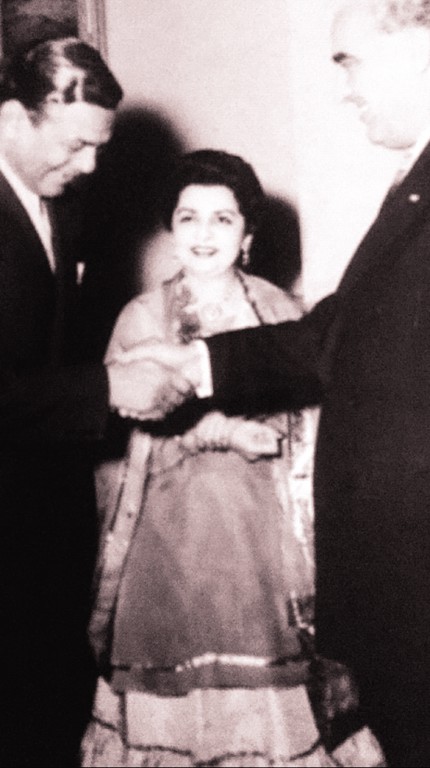
Mushtaq’s day started at 5:30 in the morning, when the dew sat on his roses and the horizon shone in between the shades of purple and pink. He would get into his jodhpurs and ride through the countryside, with four attendants in tow – taking notes, inspecting his lands, one lot a day. Breakfast of steaming Nihari and Khameeri roti was spread out and ready in the verandah by his return.
Munshi Ji Ameer Jan would arrive at exactly 1 PM to work with his ‘Sarkar Sahab’ till late in the day.
Because of his influence in the area, Mushtaq was given an honorary job as a Deputy Collector, a Class 1 gazetted officer in the British Government. ‘Khan Bahadur’ was his title for meritorious services rendered.
Life was good but somewhere during the times when the children were growing up, he developed an intense need for God. He joined the Madrasa Ashrafia founded by Maulana Ehtisham Ul Haq Thanvi, the nephew of Maulana Ashraf Ali Thanvi. Very slowly a change began: one that would take firm roots and completely alter his personality.
However much he was inclined to religion himself, Mushtaq made sure that his three sons got a proper education, possibly to make up for what he had missed out on himself. His boys were very fortunate to be taught English by the famous Urdu poet Firaq Gorakhpuri at the University of Allahabad, thus firmly establishing their love for Urdu and Persian poetry. Gohar Ara Begum aka Zakkan or Zakia, the lovely, soft, silky-skinned firstborn and only daughter, however, was hardly out of school before she was married off to the most handsome Akhtar Hussain, an officer of the prestigious ICS (Indian Civil Service).
But the good times had to end.
It was the evening of the 14th of August 1947, everyone was glued to the radio as the Viceroy of India Lord Mountbatten declared the independence of India and the creation of Pakistan. Jawaharlal Nehru spoke next and then Quaid-e Azam, ending dramatically with “Pakistan zindabad!” Almost immediately, one of the greatest migrations in human history began; communal riots erupted and a massive massacre took place.
In the days and months that followed, Mushtaq’s family disbanded. His wife Husn Ara at the time was with their older son Aftab Ahmad Khan aka ‘Afsar Mian,’ also an officer of the ICS, posted in Chittagong as the Deputy Commissioner. Afsar Mian took her directly to Karachi, in the newly formed West Pakistan, where the family had decided to meet. Mushtaq’s two younger sons Sultan Ahmad Khan aka ‘Sultan Mian’ and Shehzad Ahmad Khan aka ‘Raees Mian’ (my father) too, like most enthusiastic, patriotic students who loved their leader the Quaid, joyously proceeded to Karachi. The family camped in Zakia and Akhtar Hussain’s home in Bath Island. Zakia had her house completely full: six adults and her three children Eny, Minnal and Akkoo.
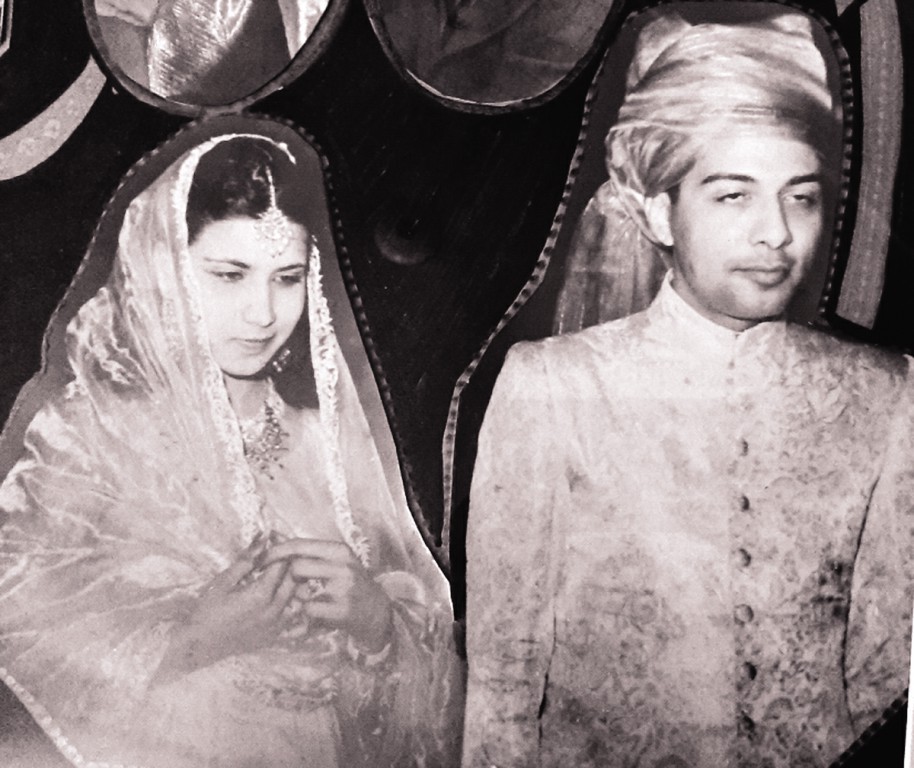
Mushtaq had to stay back to sort out the limiting effect that the new Indian land reforms, especially the Zamindari Abolition Act and the imposition of the land ceiling had on his immense land holdings. One year and a loss of almost everything to the state later, Sultan Mian was sent to India to bring him to Pakistan.
The family moved into a beautiful bungalow in Gandhi Garden Karachi.
But Mushtaq was claustrophobic; he longed to go back to his free life.
When young Minnal would sing Talat Mehmood’s song ‘Ae dil mujhe aisi jaga le chal jahan koi na ho,’ he would weep uncontrollably, desperately missing his homeland: each green leaf and delicate petal, each dancing bird and scurrying squirrel, the song of his own garden and the expanse of his own landscape.
P.S.: In my last article I had mentioned that Raffan Begum had remained single all her life, but I was told by her family that she had indeed been married at a much later age, very quietly, to someone she liked. Unfortunately, he passed away 6 years later.
Shehla Ahmad Khan is a doctor and genealogy enthusiast based in Lahore. She can be reached at shehla.ahmad164@gmail.com
This once tall, lean, handsome Pathan, born in 1889 in Moradabad, India, was the son of Nawab Sajjad Ahmad Khan ‘Raees-e-Azam Moradabad’ and Malika Ferozi Begum. Ferozi Begum’s family was from Malakand and bore the title of ‘Sahabzadgaan of Malakand.’ As the story goes, her parents had moved with their family to Moradabad after the 1897 Siege of Malakand by the British.

Sahabzada Mushtaq Ahmed Khan grew up with his other two younger siblings Sahabzada Shafaat Ahmad Khan and Sahabzadi Kishwar Zamani Begum in the family’s palatial haveli in Moradabad. He was his mother’s ‘Chanda’ and her clinging love demanded more time and attention from him than from the other children. Mushtaq had to forsake going abroad for higher studies because of his mother’s emotional dependence on him; indeed her love for him was such that on her deathbed her last cry was ‘Chanda!’
He would get into his jodhpurs and ride through the countryside, with four attendants in tow – taking notes, inspecting his lands, one lot a day. Breakfast of steaming Nihari and Khameeri roti was spread out and ready in the verandah by his return
Mushtaq thus missed out on a possible sparkling career and the popularity that his younger brother Shafaat enjoyed. Sir Shafaat went on to get his Doctorate degree in History from Dublin, Ireland, becoming a Professor of History and Chair of the Modern Indian History Department at the University of Allahabad. His marriage, arranged by Sir Syed Ahmed Khan to Begum Fehmida Khanum, daughter of Justice Shahdin, was a union of two politically influential families. Mushtaq’s sister Kishwer Zamani Begum, too, was an institution in herself. A truly emancipated woman far ahead of her times, she had shed her burqa, smoked publicly and had joined politics. She chose to marry Dr. Col. M.A.Rahman, a surgeon in the prestigious Royal Army Medical Corps(RAMC).

It is no wonder that Mushtaq felt a bit disadvantaged compared to his larger-than-life siblings. Getting married to the autocratic Malika Husn Ara Begum (Dillan) daughter of the Nawab Sikander Begum, princess of Rampur, did not make life easier. But while she scoffed and belittled him now and then, she made him the richest of them all. Her dowry inundated Mushtaq’s coffers. They built in village Mankula, Moradabad, a splendid haveli on 10 acres of wooded land. Mushtaq with his deep aesthetic sense and creative ability knew what his dream house would be like. Rolling gardens where his children and grandchildren would romp, mango and peepal and neem trees that they would swing from, atop an old wooden swing right above that lawn thatch that would cushion their fall, bushy tangled thickets where they would hide; a huge, open-to-the-sky tile-mosaic inner courtyard where wedding festivities would be conducted; outer courtyards with charming arbours, completely screened against mosquitoes, where the family would sit for late afternoon tea, colourful mirror glasswork ceilings and deep verandahs lined with takhts where breakfast would be served for early risers. Mushtaq fulfilled this dream meticulously. It is no wonder, then, that much later, the Rani of Sainspur, Rajkumari Reena, remarked to my cousin Eny that it was a known fact in those days that there was no property as well maintained as Mankula.

Mushtaq’s day started at 5:30 in the morning, when the dew sat on his roses and the horizon shone in between the shades of purple and pink. He would get into his jodhpurs and ride through the countryside, with four attendants in tow – taking notes, inspecting his lands, one lot a day. Breakfast of steaming Nihari and Khameeri roti was spread out and ready in the verandah by his return.
Munshi Ji Ameer Jan would arrive at exactly 1 PM to work with his ‘Sarkar Sahab’ till late in the day.
Because of his influence in the area, Mushtaq was given an honorary job as a Deputy Collector, a Class 1 gazetted officer in the British Government. ‘Khan Bahadur’ was his title for meritorious services rendered.
Life was good but somewhere during the times when the children were growing up, he developed an intense need for God. He joined the Madrasa Ashrafia founded by Maulana Ehtisham Ul Haq Thanvi, the nephew of Maulana Ashraf Ali Thanvi. Very slowly a change began: one that would take firm roots and completely alter his personality.
However much he was inclined to religion himself, Mushtaq made sure that his three sons got a proper education, possibly to make up for what he had missed out on himself. His boys were very fortunate to be taught English by the famous Urdu poet Firaq Gorakhpuri at the University of Allahabad, thus firmly establishing their love for Urdu and Persian poetry. Gohar Ara Begum aka Zakkan or Zakia, the lovely, soft, silky-skinned firstborn and only daughter, however, was hardly out of school before she was married off to the most handsome Akhtar Hussain, an officer of the prestigious ICS (Indian Civil Service).
But the good times had to end.
It was the evening of the 14th of August 1947, everyone was glued to the radio as the Viceroy of India Lord Mountbatten declared the independence of India and the creation of Pakistan. Jawaharlal Nehru spoke next and then Quaid-e Azam, ending dramatically with “Pakistan zindabad!” Almost immediately, one of the greatest migrations in human history began; communal riots erupted and a massive massacre took place.
In the days and months that followed, Mushtaq’s family disbanded. His wife Husn Ara at the time was with their older son Aftab Ahmad Khan aka ‘Afsar Mian,’ also an officer of the ICS, posted in Chittagong as the Deputy Commissioner. Afsar Mian took her directly to Karachi, in the newly formed West Pakistan, where the family had decided to meet. Mushtaq’s two younger sons Sultan Ahmad Khan aka ‘Sultan Mian’ and Shehzad Ahmad Khan aka ‘Raees Mian’ (my father) too, like most enthusiastic, patriotic students who loved their leader the Quaid, joyously proceeded to Karachi. The family camped in Zakia and Akhtar Hussain’s home in Bath Island. Zakia had her house completely full: six adults and her three children Eny, Minnal and Akkoo.

Mushtaq had to stay back to sort out the limiting effect that the new Indian land reforms, especially the Zamindari Abolition Act and the imposition of the land ceiling had on his immense land holdings. One year and a loss of almost everything to the state later, Sultan Mian was sent to India to bring him to Pakistan.
The family moved into a beautiful bungalow in Gandhi Garden Karachi.
But Mushtaq was claustrophobic; he longed to go back to his free life.
When young Minnal would sing Talat Mehmood’s song ‘Ae dil mujhe aisi jaga le chal jahan koi na ho,’ he would weep uncontrollably, desperately missing his homeland: each green leaf and delicate petal, each dancing bird and scurrying squirrel, the song of his own garden and the expanse of his own landscape
When young Minnal would sing Talat Mehmood’s song ‘Ae dil mujhe aisi jaga le chal jahan koi na ho,’ he would weep uncontrollably, desperately missing his homeland: each green leaf and delicate petal, each dancing bird and scurrying squirrel, the song of his own garden and the expanse of his own landscape.
P.S.: In my last article I had mentioned that Raffan Begum had remained single all her life, but I was told by her family that she had indeed been married at a much later age, very quietly, to someone she liked. Unfortunately, he passed away 6 years later.
Shehla Ahmad Khan is a doctor and genealogy enthusiast based in Lahore. She can be reached at shehla.ahmad164@gmail.com

